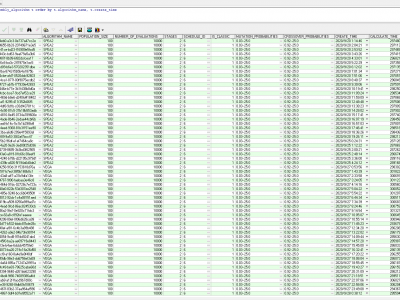Machine Learning
This is an alarm management dataset based on the “Tennessee-Eastman-Process” (TEP). The presented dataset aims to provide a suitable benchmark for the development and validation of alarm management methods in complex industrial processes using both quantitative data and qualitative information from different sources. Unlike real industrial processes, the simulation of the TEP allows to design and generate abnormal situations, which can be repeated and varied without risking the loss of equipment or harming the environment.
- Categories:
 3902 Views
3902 Views
This data-set consists of 3-phase differential currents of internal faults and 4 other transients cases for Phase Angle Regulators (PAR). The transients other than faults include magnetizing inrush, sympathetic inrush, external faults with CT saturation, and overexcitation conditions.
PSCAD/EMTDC software is used for simulation of the internal faults and the transients.
- Categories:
 629 Views
629 Views"The friction ridge pattern is a 3D structure which, in its natural state, is not deformed by contact with a surface''. Building upon this rather trivial observation, the present work constitutes a first solid step towards a paradigm shift in fingerprint recognition from its very foundations. We explore and evaluate the feasibility to move from current technology operating on 2D images of elastically deformed impressions of the ridge pattern, to a new generation of systems based on full-3D models of the natural nondeformed ridge pattern itself.
- Categories:
 2227 Views
2227 ViewsThis dataset is created with the usage of Galvanic Skin Response Sensor and Electrocardiogram sensor of MySignals Healthcare Toolkit. MySignals toolkit consists of the Arduino Uno board and different sensor ports. The sensors were connected to the different ports of the hardware kit which was controlled by Arduino SDK.
- Categories:
 1689 Views
1689 ViewsThe dataset consists of echo data collected at the Matre research station (61°N) of the Institute of Marine Research (IMR), Norway. Six square sea cages (12 × 12 m and 15 m depth; approximately 2000 m^3) were used. The fish's vertical distribution and density were observed continuously by a PC-based echo integration system (CageEye MK IV, software version 1.1.1., CageEye AS, Steinkjer, Norway) connected to an upward facing transducer which multiplexes between 50 kHz (42° acoustic beam angle) and 200 kHz (14° beam angle).
- Categories:
 674 Views
674 ViewsThe current maturity of autonomous underwater vehicles (AUVs) has made their deployment practical and cost-effective, such that many scientific, industrial and military applications now include AUV operations. However, the logistical difficulties and high costs of operating at-sea are still critical limiting factors in further technology development, the benchmarking of new techniques and the reproducibility of research results. To overcome this problem, we present a freely available dataset suitable to test control, navigation, sensor processing algorithms and others tasks.
- Categories:
 3742 Views
3742 Views
This is the five mainstream stock market indices dataset. It includes XJO, DJI, IXIC, HSI, and N225 indices from Sep. 2010 ~ Aug. 2020.
- Categories:
 393 Views
393 ViewsThis dataset is flotation froth sequence images, a total of 2386 folders, that is, 2386 groups of froth sequence images. The data comes from a mine in southern China, and the digital camera collected the froth videos every 5 minutes during the period from 2019.08.01 to 2019.12.01. Each group of froth sequence images contains 12 consecutive frames and the sampling time is 0.4s. This dataset is suitable for image processing, pattern recognition, and artificial intelligence.
- Categories:
 1210 Views
1210 ViewsThe worker allocation problem in the aircraft final assembly line was solved by several multi-objective evolutionary algorithms. The data set cannot be published to the public due to involving military secrets. However, in order to validate it, you can download the oracle dataset “mes_aps.rar” which contains (6+1)×30=210 independent experiments in table “assembly_algorithm” and all evaluated individuals in table “assembly_result”.
- Categories:
 121 Views
121 ViewsDeep learning undoubtedly has had a huge impact on the computer vision community in recent years. In light field imaging, machine learning-based applications have significantly outperformed their conventional counterparts. Furthermore, multi- and hyperspectral light fields have shown promising results in light field-related applications such as disparity or shape estimation. Yet, a multispectral light field data\-set, enabling data-driven approaches, is missing. Therefore, we propose a new synthetic multispectral light field dataset with depth and disparity ground truth.
- Categories:
 1882 Views
1882 Views





